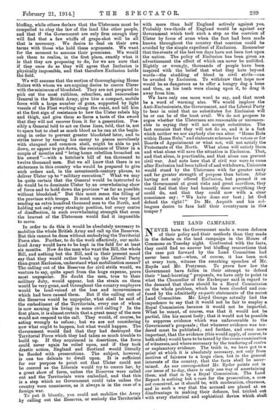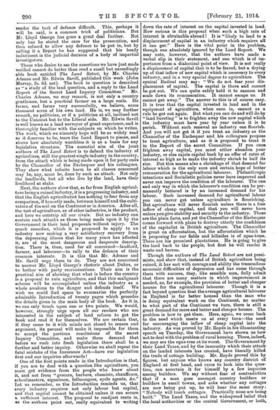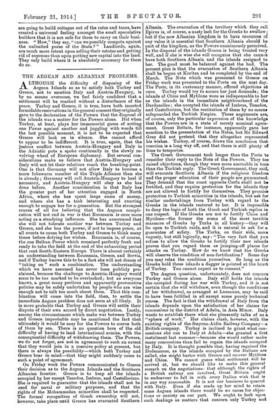THE LAND CAMPAIGN.
NEVER have the Government made a worse defence of their policy and their methods than they made in the debate on the land campaign in the House of Commons on Tuesday night. Confronted with the facts, they could find no answer but bluffing reassertions that the case put forward by the Land Committee had never been met—when, of course, it has been met at every turn, witness the smashing speeches of Mr. Roy& and Mr. Pretyman. To prove how low the Government have fallen in their attempt to defend their " land-bursting " proposals, we have only to point to what the Chancellor of the Exchequer said in regard to the demand that there should be a Royal Commission on the whole problem, which has been clouded and con- fused by the admittedly ex-parte statements of the secret Land Committee. Mr. Lloyd George actually had the impudence to say that it would not be fair to employ a Royal Commission because it would not be impartiaL What he meant, of course, was that it would not be partial, like his secret body ; that it would not be possible to suppress evidence which was unfavourable to the Government's proposals ; that whatever evidence was ten- dered must be published ; and further, and even more important, that the evidence (this would apply, of course, to both sides) would have to be tested by the cross-examination of witnesses,and where necessary by the tendering of contra or explanatory evidence. The truth is, we have got to a point at which it is absolutely necessary, not only from motives of fairness to a large class, but in the general interests of the country, that the facts shall be ascer- tained. As our correspondent Mr. Ryder points out in our issue of to-day, there is only one way of ascertaining them, and that is by a Royal Commission. The Land Report is nothing but a case for the prosecution, a case not conceived, as it should be, with moderation, clearness, and in such a way that the accused are placed at no disadvantage in making their defence, but tricked out with every rhetorical and sophistical device which shall
render the task of defence difficult. This, perhaps it will be said, is a common trick of politicians. But Mr. Lloyd George has gone a great deal further. Not only has he stated the case for the prosecution, and then refused to allow any defence to be put in, but by calling it a Report he has suggested that his heady indictment is the judicial decision of a body of impartial investigators.
Those who desire to see the assertions we have just made verified cannot do better than read a small but exceedingly able book entitled The Land Retort, by Mr. Charles Adeane and Mr. Edwin Savill, published this week (John Murray, 2s. 6d. net). The book in question is described as "a study of the land question, and a reply to the Land Report of the Secret Land Inquiry Committee." Mr. Charles Adeane, we may remark, is not only a country gentleman, but a practical farmer on a large scale. He farms, and farms very successfully, we believe, some thousand acres of his own land. He is, we may further remark, no politician, or if a politician at all, inclined not to the Unionist but to the Liberal side. Mr. Edwin Savill is well known as a land surveyor of great experience, and is thoroughly familiar with the subjects on which he writes. The work, which we sincerely hope will be as widely read as it deserves to be, tears the Land Report to pieces, and shows how absolutely worthless it is as a basis for any legislative structure. The essential aim of the joint authors of The Land _Retort is to defend the industry of agriculture, still the greatest single industry in the country, from the attack which is being made upon it for party ends by the Chancellor of the Exchequer and his colleagues. They show what infinite harm to all classes concerned may be, nay, must be, done by such an attack. Not only the landlords, but all who live by the land, have their livelihood at stake.
Next, the authors show that, so far from English agricul- ture being a ruined industry, it is a progressing industry, and that the English agriculturist has nothing to fear from any comparison, if honestly made, between himself and the culti- vators of the soil on the Continent or in America. After all, the test of agriculture, as of other industries, is the product, and here we outstrip all our rivals. But no industry can sustain such attacks as those being made upon it by the Government in their land proposals without injury. The quack remedies, which it is proposed to apply to an industry now making a very satisfactory recovery from the depressing illness that for many years has affected it, are of the most dangerous and desperate descrip- tion. There is, then, need for all concerned—landlord, farmer, and labourer—to rally to the defence of their common interests. It is this that Mr. Adeane and Mr. Sevin urge them to do. They. are not concerned to answer Mr. Lloyd George's rhetoric about Dukes, or to bother with party recriminations. Their aim is the practical aim of showing that what is before the country is a proposal to ruin agriculture, and that this malignant scheme will be accomplished unless the industry as a whole awakens to the danger and defends itself. We wish we could find space to summarise the perfectly admirable Introduction of twenty pages which precedes the details given in the main body of the book. As it is, we can only touch upon one or two points. We would, however, strongly urge upon all our readers who are interested in the subject of land reform to get the book and read it for themselves. We are certain that, if they come to it with minds not closed to reason and argument, its perusal will make it impossible for them to accept the partisan conclusions of the secret Inquiry Committee, and make them demand that before we rush into fresh legislation there shall be a further and better inquiry. Otherwise we shall repeat the fatal mistake of the Insurance Act—have our legislation first and our inquiries afterwards!
One of the first points made in the Introduction is that, if you are to deal with a question like agriculture, you must get evidence from the people who know about it, and not from "grocers, barbers, chemists, chauffeurs, schoolmasters, signalmen, fellmongers, cycle agents, Ike." Let us remember, so the Introduction reminds us, that every industry requires not only labour but capital, and that capital cannot be obtained unless it can secure a sufficient interest. The proposal to readjust rents is, as the authors point out, really equivalent to writing down the rate of interest on the capital invested in land. How serious is this proposal when such a high rate of
interest is obtainable abroad! It is "likely to lead to a
displacement of capital in an industry which requires all it can get." Here is the vital point in the problem, though one absolutely ignored by the Land Report. We may note, however, that the authors have made a verbal slip in their statement, and one which is of im- portance from a dialectical point of view. It is not really a displacement of capital that is to be feared, but a drying up of that inflow of new capital which is necessary to every industry, and in a very special degree to agriculture. The cynical Radical may say "We do not fear your dis- placement of capital. The capital is there and cannot be got out. We can quite safely hold it to ransom and scale down its remuneration. It cannot escape us. It cannot get away." The answer to this is of course easy. It is true that the capital invested in land and in the equipment of agriculture, when once in, cannot as a rule be got out again. But what you can do and will do by " land bursting" is to frighten away the new capital which the industry must have year by year unless it is to perish. Without such renewal no industry can flourish. And you will not get it if you treat an industry as the Chancellor of the Exchequer and his colleagues propose to treat agriculture, and as it is proposed to treat it in the Report of the secret Committee. If you once frighten away capital, you must either abandon your industry, or else cajole capital back by an offer of rates of interest so high as to make the industry shrink to half its size. But this means also a shrinkage of that demand for labour which is the only sure and certain hope of better remuneration for the agricultural labourer. Philanthropic intentions and Socialistic policies never have improved and never can improve the condition of the labourer. The one and only way in which the labourer's condition can be per- manently bettered is by an increased demand for his labour. Such increased demand for agricultural labour you can never get unless agriculture is flourishing. But agriculture will never flourish unless there is a free inflow of cheap capital, and that you will never have unless you give stability and security to the industry. These are the plain facts, and yet the Chancellor of the Exchequer comes forward with plans to destroy utterly the confidence of the capitalist in British agriculture. The Chancellor is great on afforestation, but the afforestation which he is proposing for our fields and hillsides is of upas-trees. These are his promised plantations. He is going to give the land back to the people, but first he will render it waste and barren.
Though the authors of The Land Retort are not pessi- mists, and show that, instead of British agriculture being ruined, it has met with courage and ability the tremendous economic difficulties of depression and has come through them with success, they, like sensible men, fully admit that there are many matters in which improvement is needed, as, for example, the provision of better and cheaper houses for the agricultural labourer. Though it is a fact beyond question that the average agricultural labourer in England is far better housed than the man who is doing equivalent work on the Continent, no matter to what part of the Continent we turn, there is still a great demand for more and better and cheaper houses. The problem is how to get them. Here, again, we come back to the need which meets us at every turn—the need for encouraging the inflow of cheap capital into the industry. As was proved by Mr. Royds in his illuminating speech on Tuesday, the Government have shown us how not to deal with the problem of rural housing. There, indeed, we may see the upas-tree at its worst. The Government by their Land Taxes, and by the insecurity which their attack on the landed interests has created, have literally killed the trade of cottage building. Mr. Royds proved this by figures, but anyone who knows any country district of England at first hand, and cares to look into the ques- tion, can ascertain it for himself by a few inquiries among builders. We say without fear of contradiction that if a man goes amongst country builders or builders in small towns, and asks whether any cottages are now being put up, ho will bear the same story : "Nobody will touch cottages. Practically none are being built." The Land Taxes, and the widespread belief that the local authorities or the central Government, or both, are going to build cottages out of the rates and taxes, have created a universal feeling amongst the small speculative builders that it is not safe for them to carry on their busi- ness. "How," they say," can we possibly compete against the unlimited purse of the State ?" Landlords, again, are much more intent upon selling their estates and getting rid of expenses than upon putting new capital into the land. They only build where it is absolutely necessary for them do so.
















































 Previous page
Previous page